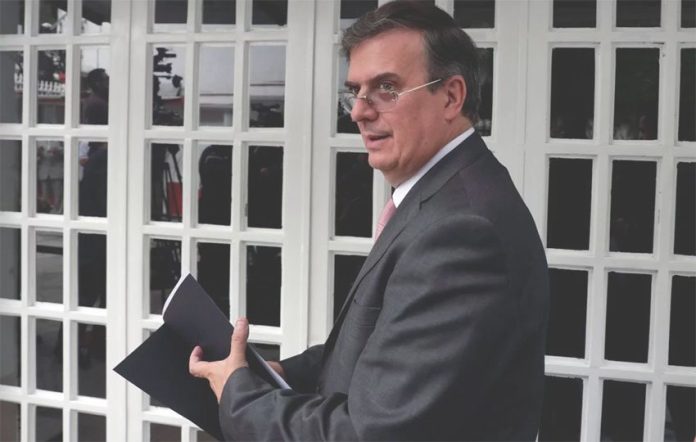President Donald Trump’s announcement that he will impose a 5% tariff on all Mexican imports this month to pressure the country to curb migration flows to the United States hit stocks, oil, the peso and economic growth forecasts yesterday, and could put the new North American trade deal at risk.
The Mexican Stock Exchange fell 1.38% Friday, Mexican crude prices dipped 3% to US $56.57 per barrel and the peso lost more than 3% against the dollar before strengthening slightly to trade at just under 20 to the greenback.
Bank of México Governor Alejandro Díaz de León said the tariffs will generate volatility in the exchange rate and could have an impact on both inflation and economic growth, while analysts at oil broker PVM said they will affect the lucrative cross-border energy trade.
“U.S. refiners import roughly 680,000 barrels per day of Mexican crude. The 5% tariff adds an extra $2 million to the cost of their daily purchases,” they said.
The Dow Jones, S&P 500 and Nasdaq indexes in the United States also lost ground yesterday as did stock markets in Japan and Europe, mainly because the value of shares of large auto makers and parts suppliers fell on news of Trump’s tariff.
Many companies, auto makers among them, moved to Mexico from China last year after trade tensions between the latter country and the United States flared.
However, the viability of Mexico as a refuge from United States protectionism is now at risk.
The U.S. president said Thursday that the universal 5% tariff on Mexican goods will start on June 10 and increase by an additional 5% at the start of each subsequent month to a maximum of 25% if Mexico doesn’t take “action to dramatically reduce or eliminate the number of illegal aliens crossing its territory into the United States.”
Experts warned that the new tariffs will damage the economy on both sides of the border and that Mexico could introduce its own retaliatory tariffs, although President López Obrador said in a letter to Trump that he doesn’t want confrontation and doesn’t believe in “a tooth for a tooth” and “an eye for an eye.”
In the United States, the governors of Texas and New Mexico both voiced their opposition to Trump’s plan, warning that their economies would take a significant hit.
“I’ve previously stated my opposition to tariffs due to the harm it would inflict on the Texas economy, and I remain opposed today,” Greg Abbott of Texas said.
New Mexico Governor Michelle Lujan Grisham said that the tariff on imports has the “potential to be economically catastrophic” for the state.
She called on Trump to retract his proposal, warning that tens of thousands of jobs were at stake.
Goldman Sachs said that if the tariffs take effect as planned it is less likely that the United States-Mexico-Canada Agreement (USMCA) will be ratified before 2020 elections in the U.S, while Fitch Ratings also warned that the approval process could be delayed.
However, acting White House chief of staff Mick Mulvaney told reporters that implementation of the new tariff won’t affect the ratification process.
“The two are absolutely not linked,” he said. “These are not tariffs as part of a trade dispute. These are tariffs as part of an immigration problem.”
The White House sent a draft statement to Congress on Thursday that would allow Trump to submit the USMCA for ratification after 30 days, and United States Vice President Mike Pence said Thursday that he was pushing to get the trade deal approved this summer.
The Mexican Senate began examination of the trade pact yesterday and López Obrador has urged its ratification, while Canadian Foreign Minister Chrystia Freeland said that Canada is pressing ahead to ratify the deal despite its trade partners’ “bilateral issue.”
But even if ratification of the USMCA proceeds relatively unhindered, the Mexican economy appears poised to take a hit as the tariffs will affect exports to the United States worth close to US $1 billion a day.
BBVA Bancomer cut its 2019 growth forecast to 1% from 1.4% hours after Trump’s announcement, stating that the “tariff threat changes the outlook for monetary policy.”
Fitch also warned that the tariffs would “disrupt Mexico’s economic growth,” noting that there are already signs of a slowdown.
To present Mexico’s case against Trump’s new hard-nosed strategy, Foreign Secretary Marcelo Ebrard traveled to Washington yesterday and is scheduled to meet with United States Secretary of State Mike Pompeo on Wednesday.
“. . . There is a willingness for dialogue. We will be firm and we will defend the dignity of Mexico,” Ebrard said on Twitter.
The foreign secretary declared yesterday that migration flows from Central America to the United States is “not the responsibility of Mexico” but López Obrador said that Ebrard will present data to U.S. officials that demonstrate the government’s efforts to control migration into and through the country.
President López Obrador said today that Mexico has a plan to avoid economic damage should the tariffs proceed to prevent “. . . further impoverishment of the people . . .”
“. . . we are going to transform Mexico into a powerhouse” even if the tariffs are applied, he said.
Source: Milenio (sp)
